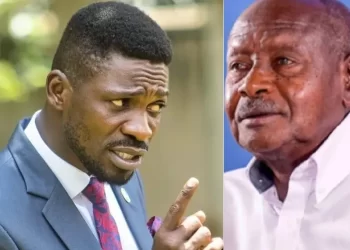In a country where corruption festers like an open wound, the recent censure motion against three National Resistance Movement (NRM) Commissioners and former Leader of Opposition Mathias Mpuuga is a flicker of hope in an ocean of moral decay. The motion, which has finally garnered the required number of signatures for tabling in parliament, represents a small but significant step towards dragging the corrupt elite into the light.
The acquisition of the necessary signatures is not just a procedural victory; it is a damning indictment of the endemic corruption that has long tainted Uganda’s parliament. Lwemiyaga County legislator Theodore Ssekikubo, a valiant crusader against this rot, aptly noted that the overwhelming support for the motion signals there are still some lawmakers committed to purging this contaminated institution. However, this motion also starkly exposes the malignant corruption at the heart of Uganda’s political landscape, where the NRM’s suffocating grip has nurtured a fertile ground for graft and impunity.
For far too long, Ugandans have watched in anguish as the nation’s so-called leaders, the supposed custodians of public trust, have shamelessly pillaged state resources. The illegal sharing of Shs1.7 billion by the implicated commissioners and Mathias Mpuuga is not an isolated incident but a symptom of a systemic cancer. This flagrant theft is a vicious insult to every Ugandan who struggles daily, underscoring the gross disparities and the moral depravity of those in power.
The movers and seconders of the motion, driven by a genuine hunger for accountability, have performed admirably in rallying support. Surpassing the required number of signatures, collecting more than needed to table the motion, is a testament to their tenacity and the burgeoning discontent among MPs who are fed up with the status quo. Yet, it also serves as a scathing indictment of the remaining parliamentarians who stay indifferent or complicit in the face of glaring corruption.
Jackson Atima of Arua Central Division and Dr. Florence Asiimwe Akiiki, two MPs who appended their signatures to ensure the motion’s success, have voiced the frustration of their constituents and their own moral outrage. Their actions are a direct retort to the brazen arrogance of the four commissioners who, despite being mired in scandal, have stubbornly clung to their positions. This obstinacy epitomizes the NRM’s broader ethos, where power is wielded with absolute impunity and accountability is an alien concept.
The support for the censure motion, now standing at 178 signatures, surpassing the required 177, sets the stage for a long-overdue debate on the corruption allegations. However, one must question why it has taken so long and why such motions are not a more frequent occurrence in a parliament riddled with corruption. The answer lies in the NRM’s iron-fisted grip on power, where dissent is ruthlessly crushed, and loyalty to the regime is often rewarded with protection from scrutiny.
As Ssekikubo and his colleagues prepare to submit the notice of motion to the Speaker of Parliament, Anita Among, and Clerk, Adolf Mwesigye, one can only hope that this will mark the beginning of a genuine effort to root out corruption. However, given Among’s own dubious track record, there is little cause for optimism. Her previous handling of corruption allegations has often been lackluster, if not outright dismissive. The challenge now is whether the Speaker will allow a robust and transparent debate or if she will once again act as a shield for her corrupt comrades.
The censure motion is a litmus test for Uganda’s parliament. It is a chance for MPs to prove that they are not mere puppets of a corrupt regime but representatives of the people’s will. Yet, history has shown that in Uganda, lofty ideals often fall prey to the murky waters of political expediency. The true test will be in the actions that follow the debate. Will there be real consequences for the implicated commissioners and Mpuuga, or will this be another case of much ado about nothing?
The Ugandan public, long disillusioned by the endemic corruption, will be watching closely. They have been let down time and again by leaders who have prioritized personal gain over public service. This motion, therefore, is not just about four individuals; it is about setting a precedent, about showing that no one is above the law. If parliament fails to act decisively, it will be yet another betrayal, reinforcing the perception that Uganda’s leaders are nothing more than corrupt conspirators, cloaked in the guise of public servants.







Discussion about this post